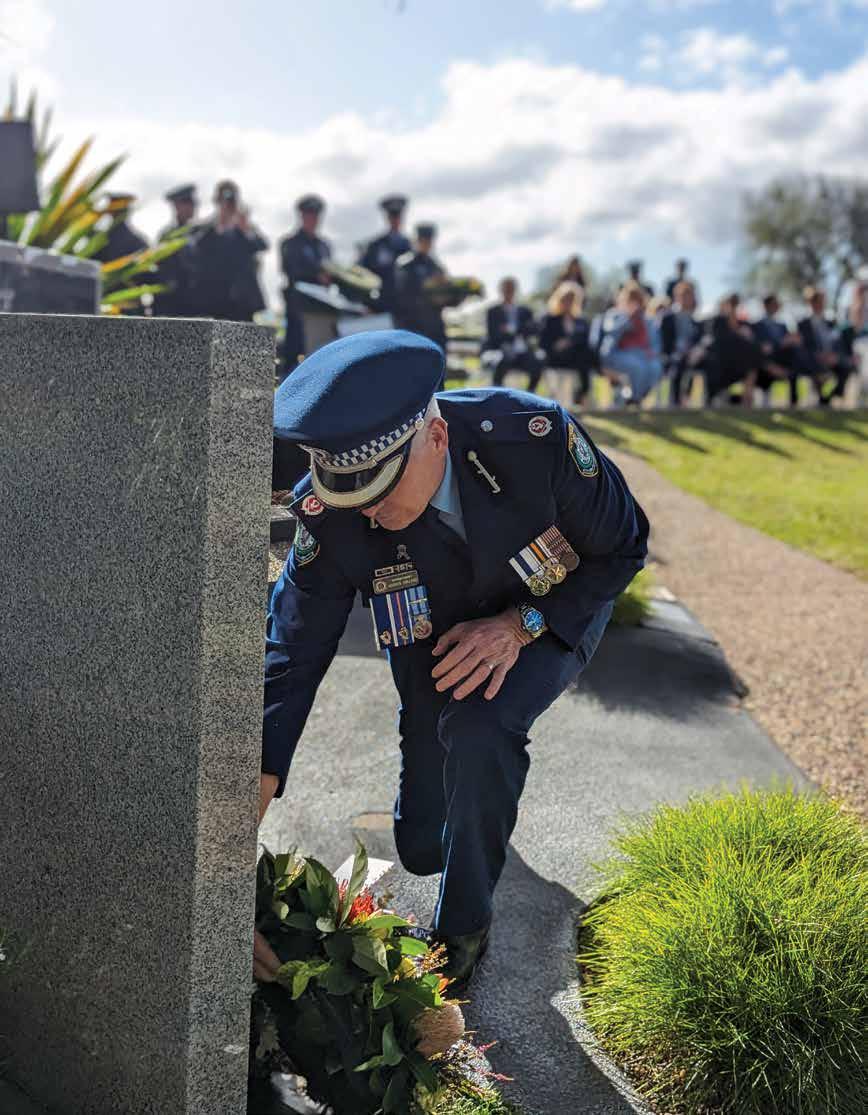
SEPT|OCT 2023 PRINT POST PUBLICATION NO. PP100018976
Remembrance Day Issue President's message p3 Photo Essay p21-22 Legacy p30-31 Premier's Speech p40
Police News
Police Bank Ltd. ABN 95 087 650 799. AFSL/Australian Credit Licence No. 240018. 131 728 policebank.com.au THANK YOU FOR YOUR SERVICE Police Remembrance Day 2023
MANAGEMENT TEAM
Mr P. Gooley - Secretary
Mr P. Hannen - Asst. Sec. Organising
Ms K. Membreno - Asst. Sec. Industrial
Mr R. Del Vecchio - Asst. Sec. Admin
Mr A. Howell - Asst. Sec. Legal Services
Ms C. Prosser - EA and Events Coordinator CPOB
Mr J. Goddard - Lead Organiser
Ms R. Neil - Senior Industrial Officer
MEMBER SUPPORT
Mr I. Johnstone - Member Support Coordinator
Mr. E Murphy - Member support officer
TEAMS
CENTRAL METRO/SOUTHERN
Mr M. Evans - Organiser
Mr T. McGregor - Industrial Officer
NORTH WEST METRO/NORTHERN
Mr. G. Price - Organiser
Ms A. Fleming - Industrial Officer
Mr L. Solomon - Industrial Officer
SOUTH WEST METRO/WESTERN
Mr R. Sheraton - Organiser
Mr P. Richardson - Industrial Officer
Ms. C. Palma - Industrial Officer
NON LAC (SPECIALISTS)
Mr A. Stokes - Organiser
Ms. N. Lucaci - Organiser
Mr J. Ludkin - Organiser
Mr A. Boromisa - Industrial Officer
Mr G. Doyle - Industrial Officer
Ms K. Young - Industrial Officer
Ms E. Hampson - Industrial Officer
LEGAL SERVICES
Ms K. Lally - Senior Coordinator
Ms A. Reece - MET Officer
Ms E. Hagan - MET Officer
Ms C. Jones - MET Officer
Ms J. Whalebone - In House Counsel

Ms C. Young – Solicitor
Mr. B. Lee – Solicitor
Mr D. Longhurst - Solicitor
Ms B. Golledge - Senior Legal Clerk
Ms S. George - Paralegal
Ms B. O’Reilly - Clerk
Ms C. Crasto – Clerk


RELATIONSHIPS & STRATEGY
Mr T. Bear - Manager RESEARCH
Mr A. Skinner - Research Manager
Dr K. Linklater - Research Officer
COMMUNICATIONS

Ms E. King - Comms Officer
Mr M. Rowland - Comms Officer
INFORMATION ORGANISING CENTRE
Ms K. O’Leary - Supervisor
Ms T. Fletcher
Ms N. Hawley
Ms K. Puckeridge
Mr H. Spiby
Ms. E. Guirguis
Ms C. Crasto
ADMINISTRATIVE SERVICES
Ms N. Scott - Supervisor Memberships
Ms J. Weber - Senior Admin Officer
Ms. C. Brett – Senior Admin Officer
Ms. T. King - Support Officer
EXTENDED LEAVE
Ms S. Minahan - Industrial Officer
Ms A. Johnson - IOC
Advertisers Alert: The Police Association of NSW is the publisher of PANSW Police News. The Police Association does not accept any responsibility to any advertiser or consumer in respect to advertising appearing in PANSW Police News. For enquiries re advertising in this publication, please contact the publishers via: elyssa.king@pansw.org.au

■ Executive: Elise Hulley-Thomas p2
■ President's message p3
■ Conference Wrap Up p5-7
■ Mental health reform? p8-11
■ Rod Roberts' speech (Mental health debate) p12-13
■ Industrial Update: Rostering / Punter's Club p15

■ Dr Kate Linklater's curious journey p16-19
■ National Police Rememberance Day / Sydney p20-21
■ Hunter Valley Branch forum p23-25
■ Operational duties for physically injured officers p26-27
■ Self-Managed Super + Academic Allowances p29
■ NSW Police Legatee Deb Anderson p30-31
■ Steve Schausinger retires after 44 years service p32
■ Class 135 / 50 years on p33
■ Allure of the S*Box Rally p34-36
■ PANSW Commissioned Officers Dinner p38-39
■ Premier Chris Minns' speech (Remembrance Day) p40
■ Crossword: Beverages of the World p41
Cover Acting Assistant Commissioner Andrew Holland lays a remembrance wreath beside Woronora Cemetery's Police Memorial - 22/10/23
Disclaimer: Police Association of New South Wales (“Publisher”) advises that the contents of this publication are the sole discretion of the Police Association of New South Wales and the publication is offered for information purposes only. The publication has been formulated in good faith and the Publisher believes its contents to be accurate, however, the contents do not amount to a recommendation (either expressly or by implication) and should not be relied upon in lieu of specific professional advice. The Publisher disclaims all responsibility for any loss or damage which may be incurred by any reader relying upon the information contained in the publication whether that loss or damage is caused by any fault or negligence on the part of the publisher, its directors and employees. Copyright: All advertisements appearing in this publication are subject to copyright and may not be reproduced except with the consent of the owner of the copyright. Advertising: Advertisements in this journal are solicited from organisations and businesses on the understanding that no special considerations other than those normally accepted in respect of commercial dealings, will be given to any advertiser.

CROSSWORD ANSWERS DOWN 1 SANGRIA / 2 RUMCORPS / 3 GOONBAG / 4 BRANDY 5 DEHYDRATION / 6 VODKA / 7 FEAR / 8 SHIRAZ / 13 CLARET 14 GIN / 15 ABSINTHE / 16 PLONK / 17 ENGLAND 19 TEMPERANCE / 21 WHISKEY / 22 PONY / 24 ALCOHOLISM 27 BOBHAWKE ACROSS 1 SAKE / 9 BUDLIGHT 11 DEPRESSANT / 12 ALCOHOLICSANONYMOUS 14 GRANDFINAL / 18 FALSE / 20 SHANDY / 23 CHAMPAGNE 25 CORK / 26 DARWIN / 28 NEWYORK / 29 DUFF / 30 CREAM
CONTENTS PANSW Police News Sept-October 2023 1 Contents
103 / No.5 Sept - October 2023
@PoliceAssocNSW @policeassociation_nsw linkedin.com/company/pansw THE POLICE ASSOCIATION PUBLISHES THE PANSW POLICE NEWS IN ACCORDANCE WITH ITS PRIVACY STATEMENT WHICH IS AVAILABLE ON THE ASSOCIATION WEBSITE. PANSW POLICE NEWS IS THE OFFICIAL JOURNAL OF THE POLICE ASSOCIATION OF NEW SOUTH WALES PO BOX A1097, SYDNEY SOUTH, NSW 1232 / (02) 9265 6777 / WWW.PANSW.ORG.AU / POLICENEWS@PANSW.ORG.AU ISSN0047-9934 PUBLISHED SIX (6) TIMES A YEAR. CONNECT WITH YOUR ASSOCIATION, FOLLOW NEWS ITEMS ON PANSW SOCIAL MEDIA:
Vol
facebook.com/pansw.org
Executive Committee
Executive Officers
Elise Hulley-Thomas
Executive Member South West Metro Region Area 2







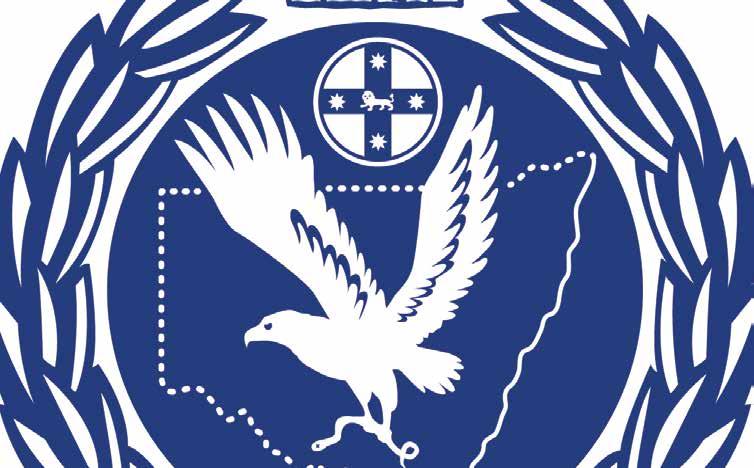
■ I attested in 2009 and was stationed at Campbelltown in General Duties. My partner and I then transferred out to Brewarrina on special remote duties. My communication skills developed quickly out there. There was a lot of farmland, bush and red dirt with large black spots where the MDT and radios wouldn't work.
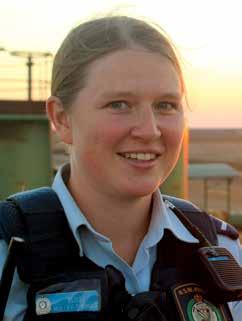
For cops that go out bush, whether they enjoy it or not depends on whether they get involved in the community. We joined local sports and developed strong relationships with the youth out there. I am a fierce advocate for younger cops going to regional areas and having that experience.
When the three-year tenure was complete, I transferred back to Campbelltown in General Duties, reaching the rank of Leading Senior Constable, moving into a Field Intelligence before becoming an Intelligence Officer.


In 2018, when Macquarie Fields and Campbelltown merged, there was a lot of unrest and conflict. The troops were


pointing the finger at the Commander at the time, and I became frustrated that no one was going to him to talk about it. I requested a meeting and discussed the issues with him over several hours. Afterward, The Commander said, 'You need to be the Chairperson for the Association here.' and I nominated at the next meeting.
I've had some good First Response Agreement negotiations and got extended hours for two cars in 2019. I also helped organize a shared appointments model at Macquarie Fields.
Last year, I asked the Commander at Campbelltown if he would be willing for an external organization that deals with welfare and trauma to deliver one of their programs in the workplace. Quest for Life came out and ran their well-being program. I have been open with the challenges that I've faced and recommend that program to anyone who tells me they are struggling. I will encourage the branches I cover now as an Executive member to approach the boss to implement that program at their






stations.
I have been to two Conferences as a delegate. The experience was eyeopening and made me want to be even more involved in the Association. It's well known that recruitment and retention are the biggest challenges in policing right now. As an Executive Member, I want to be there for the troops while they go through this.


2 PANSW Police News Sept-October 2023 EXECUTIVE WESTERN REGION Chris Jordan
SOUTHERN REGION AREA 2 Kelly
NORTHERN REGION AREA 1 Paul
SOUTHERN REGION AREA 1 Angus
NORTHERN REGION AREA 2 Darren
SW MET REGION AREA 1 Stephen
NW MET REGION AREA 1 Aaron Rynehart NW MET REGION AREA 2 Alison
SW MET REGION AREA 2
COMMISSIONED OFFICERS REGION Matthew Webb CENTRAL MET REGION AREA 2 Graham Condon CENTRAL MET REGION AREA 1 Oliver Behrens NON LAC REGION AREA 3 Peter Gurr NON LAC REGION AREA 1 Stephen McDonald NON LAC REGION AREA 4 Peter Foran NON LAC REGION AREA 2 Christine Woods TREASURER
PRESIDENT Kevin
VICE PRESIDENT Ian
Hallinan
Ireland
Longley
McCaughey
Waddington
Dixon
Elise HulleyThomas
Roger Campton
Morton
Allwood
In Rememberance

■ As police officers, we aren’t usually afforded the luxury of reflection – taking the time to consider the work that we do, the impact that we make and the colleagues we have met along the way that make the job so rewarding. On our calendar, September is an important time to go inward and ruminate, in happiness and sadness, about those officers who have made the ultimate sacrifice in the line of duty and who are no longer with us There are many events this month that honour this tradition in our extended policing family, from the NSW Police Legacy Remembrance Ride to the Wall to Wall Ride. As your President, I would encourage everyone to take a moment out of their busy schedule, whether you’re on shift or off duty, to remember those who no longer stand beside us but who inspire us to continue to pull on the blue shirt each and every day. We will remember them.
Calling out unfair treatment
With a number of critical incidents resulting in unwarranted criticism from different sides of politics, I was compelled to speak out in the media about the growing number of emergency mental health calls outs that police officers are attending.
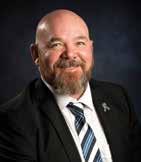
We know that our members will always carry the weight of responsibility and respond where there is violence or a risk to life and to protect members of the public. Though it is so often the case when Triple O calls come through, the sole responsibility should not fall on NSW police officers to be the first on the scene at emergency call outs where mental health care is required.
During these single-sided debates focused on adequate training and the failings of our 24/7 first responders to address these issues, why aren’t the trained mental health professionals also mentioned in the same discussion in terms of accountability? The NSW Government
needs to address this systematic failure with additional resources and funding for other departments, allowing you to focus on your core duties.
As you will see discussed further in this edition, the London Metropolitan Police have recently won their own fight in responding to mental health emergency calls and have implemented a scheme where they are no longer diverted from fighting crime and leaving this work to trained medical professionals and staff. I’d argue that a similar model should be implemented in our State. Noting the NSW Premier’s comments following my appearances in the media, I will be interested to watch further developments in this arena.
I have also called out the unfair treatment that our police officers have been receiving during Critical Incident inquests, particularly in instances where mental health call outs are involved. Our police officers are already under immense stress during the process of a Coronial Inquest – with their every move during an already high-pressure situation being scruitinised. I wrote a letter to the former Attorney-General Mark Speakman outlining concerns I had following the 2022 inquest into the death of a 22-year-
old Indigenous man Gordon Copeland. While it is important for the Coroner to have robust oversight of police operations, the officers were left traumatised while attempting to detail their version of the events that occurred. Imagine attempting to provide your recollection of a critical incident while family and friends wore shirts emblazoned with the slogan ‘Killed by police’ in the court room? With their training and conduct already being harshly examined during the process, it has broken some of our members who felt ambushed.
I’ve said before and I will state again that we have the best police force in the country, if not the world. I will take a stand when our members are being treated without respect or fairness.
Much has been said about the extreme challenges facing our workforce in relation to recruitment and retention. With detectives in some Commands being pulled off investigations and required to hit the streets again in support of our members in General Duties, vacancies are resulting in operations being impacted in unforeseen circumstances. I thank all of you for your tireless work ethic and your willingness to continually step in to support your colleagues when times are tough.
A meeting of the minds
Since our last edition, there have been a number of Forums held around the State, from returning to my old stomping ground in the Northern Region to meeting with Specialist Commands in Parramatta. It has been fantastic to get out to meet current Branch Officials and discuss the issues particular to your workplaces. It is positive to see that our members continue to be actively engaged, passing on important information and actively advocating. I would encourage you to attend if the opportunity arises in your region.
PANSW President Kevin Morton
PANSW Police News Sept-October 2023 3 PRESIDENT’S MESSAGE
SYDNEY POLICE REMEMERANCE WALL, 29/10/23
PERSONAL INJURY CLAIMS
Personal injury claims can be confusing and unpredictable. You need a lawyer experienced enough to take control and caring enough to put you at ease. Someone you can trust, backed by a team they trust.

It’s a matter of trust.
stacksgoudkamp.com.au
1800
IT TAKES A CONFIDENT, CARING HAND.
25
1800
Conference Wrap Up
Since our Conference delegates last gathered, reflecting on how far we have come is essential.
■ At the 2022 PANSW Biennial Conference, delegates passed 42 motions and over the past 16 months, work has been underway on many of them. Providing crucial updates about those motions achieved through introducing or amending policies and programs and approving funding for new initiatives is important.
Resources and staffing
Delegates focused on the inability to backfill absences and the need for a relief pool of officers in addition to reviewing the model utilized by NSWPF, which is currently based on headcount/ SAP numbers as opposed to Full Time Equivalent, i.e., the percentage of positions actually filled in working hours by officers.
In October 2022, the PANSW and NSWPF negotiated the ‘Relief Pool’ concept. As of August 2023, a trial commenced in the North West, Western and Central Metropolitan regions. The relief pool concept was developed in response to feedback from commands surrounding the need for greater leave
and resource flexibility. Officers on reduced working hours or out of the workplace on parental/long-term leave can work additional hours on an ad hoc basis to enhance operation capacity. They can be contacted and utilized while on their paid leave to work the odd shift on the roster while being paid their leave entitlement. Subject to the trial review, further rollout is expected.
FTE percentage occupancy vs. headcount is a concept the PANSW has been pushing for some time. It focuses on converting the SAP numbers into hours being worked and enabling the backfilling of available hours not being filled. The PANSW will continue to work on this concept with NSWPF to allow greater ability to backfill positions filled with part-time hours.
Pulse
Several Conference motions aimed to improve injury management practices and support and welfare services provided to police officers across NSW. With current injury rates at an alarming high, our officers must have
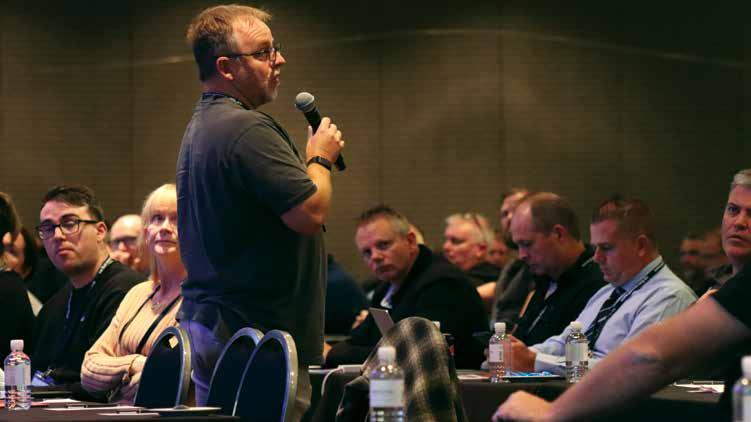
access to the best possible support services and treatment. In November 2022, the then-Coalition Government announced $79 million in funding to be put towards the PULSE program – an initiative driven by the NSWPF to better look after sworn and unsworn members' physical and psychological well-being during each stage of their career. This includes mental health support in PACS, PDs, Specialist Commands, and early access treatment initiatives. The PANSW will continue to work with the NSWPF and Government to ensure that these programs are effective and lead to better recovery and return to work outcomes for our police officers.
Remote incentives
The 2021 PANSW Conference delegates overwhelmingly advocated for improvements to attract and retain officers in remote and special remote locations. We have undertaken several surveys over the years and obtained member feedback to inform our negotiating position.
In a major win for remote police, the
CONFERENCE WRAP
PANSW Police News Sept-October 2023 5
GOOD CRAIC: BRANCHES PUT RESOLUTION, THERE'S DEBATE, AMENDMENTS AND FINALLY A VOTE
PANSW has successfully negotiated significant increases to the incentive payments for officers in remote locations, special remote locations, and more. More officers were encouraged to go bush in July 2023 with the launch of the remote incentives package, which would see up to $36,000 in extra payments, removing onerous administrative processes to claim or access benefits, reductions in tenure, reclassification to increase remote and special remote location, subsidized housing and opportunities for career progression.
This included transitional payments to officers currently in these locations to recognize their service to those communities and is designed to retain officers in these areas.
For example, from 1 July 2023, an officer in a remote location will receive an $8,000 incentive in the first year. If the officer remains attached to that position for five years, the total incentive payment will reach $36,000. That is a significant increase on the previous $5,000 oneoff payment, which could only be paid once, even if an officer moved to various remote/special remote locations during their service.
Officers already in remote/special remote locations transitioned onto the new incentives scheme from 1 July 2023. Our members in these remote communities go above and beyond to protect and serve, often without access to additional policing resources
available in our metropolitan PACS. This significant financial win will go a long way in attracting new officers to these communities and rewarding officers currently operating in our most regional remote communities, expanding their capacity and increasing workforce capability.
Award updates
The current Award and Memorandum of Understanding was voted on by members and entered into in October 2021 for a 3-year period based on the 2.5% Public Sector Wages Policy in force at that time.
Since then, the PANSW has negotiated for a number of increases.
After lobbying that followed the 2022 Conference, it was confirmed that police would be given a 3% pay increase from 1 July 2022 (inclusive of superannuation).
The PANSW has continued to negotiate for additional pay increases for our members during the term of the current 3-year Award despite being in a no further claims period within the Award.
■ In November 2022, the PANSW successfully negotiated an additional 0.5% pay increase from 1 July 2023. This brought the 2023 pay increase to 3.5% (inclusive of the 0.5% superannuation increase). The additional 0.5% for 2023 was based on an agreement in relation to productivity enhancements by NSWPF in accordance with the NSW Public Sector Wages Policy.
In July 2023, it was announced that the PANSW had successfully negotiated a further increase, bringing your total pay increase to 4.5% inclusive of 0.5% superannuation.
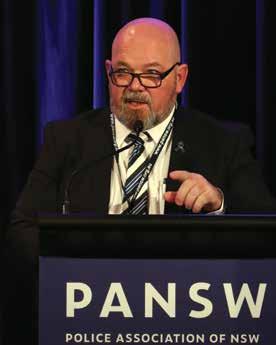
In 2021, the PANSW achieved a threeyear Award to ensure police officers had the security of the maximum available salary increases guaranteed, despite the economic challenges at the time.
With that guarantee in place, the PANSW has each year since secured additional salary increases above the amount locked in, ensuring that members had the security of guaranteed pay rises while also achieving the maximum pay rises possible in the public sector.
This brings the total increases during the current Award to:
• In 2023-24: a 4.5% pay rise, inclusive of 0.5% superannuation increase,
• In 2022-23: a 3% pay rise, inclusive of 0.5% superannuation increase,
• In 2021-22: a 2.5% pay rise, inclusive of 0.5% superannuation increase
Many motions at the 2022 Conference were passed by delegates relating to salary increases, allowances, fringe benefits, and pay scales including Sergeants and Leading Senior Constables.
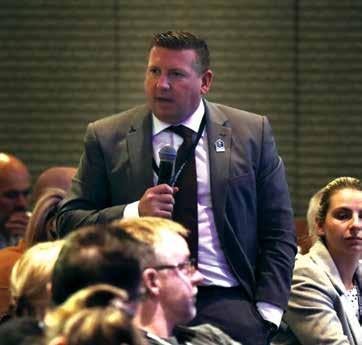

PBRI
In the lead-up to the 2023 NSW State Election, the NSW Premier committed to maintaining Workers' Compensation entitlements and the current Police
6 PANSW Police News Sept-October 2023 CONFERENCE WRAP
Blue Ribbon Insurance benefits, which provides a vital safety net for our serving men and women in blue.
Our members risk being seriously injured or even killed every time they show up for duty. The ongoing delivery of this scheme is integral to ensure that the most vulnerable members of our police officers remain protected, now and in the future. The health and welfare of the most vulnerable members of our workforce has always been the Police Association of NSW’s biggest priority and this will never change.
Parental leave entitlements
Under the direction of the 2018, 2021 and 2022 Biennial Conferences, the PANSW engaged in securing better and fairer outcomes for working parents who are required to look after their children. Improvements were made in 2021 to extend the 14 weeks of parental leave to the other parent and other forms of care including altruistic surrogacy
Pre-term birth, miscarriage leave and fertility leave were also included in the improved conditions for parents recognizing the challenging times that parents can be faced when becoming a parent. The improvements secured with the NSW Government would expand access to parental leave to both parents. For children born after 1 October 2022, an additional two weeks bonus parental leave was announced, bringing the total leave for both parents to 16 weeks each. It is clear recognition as prompted
by our delegates that the parenting responsibility rests with both parents of a child.
Partnerships
During this period, we’ve also negotiated a number of partnerships that provide additional benefits to our members.

In October 2022, we launched our partnership with CancerAid, which has rebranded as Osara Health. The programs were designed by doctors, oncologists, health coaches and researchers to help patients take control of their cancer care and assist caregivers in supporting them. The PANSW provides this service to our members and their families, which has received great feedback thus far.
In collaboration with Greyhounds As Pets, members receive priority access to adopt retired greyhounds as pet companion animals. This offer included pre-adoption vet servicing, six months of free dog food, six months of free pet insurance and post-adoption advice and support.
Optional disengagement
In 2021, the PANSW successfully lobbied and secured the Optional Disengagement Scheme. For years, our Conference delegates have advocated for a scheme allowing eligible police officers to pursue alternative careers or enter retirement in a dignified and supportive manner that recognizes
their contribution to policing in NSW. It included financial payments and career transition support to assist members in transitioning to a new career, study, retirement, or simply building their life outside the organization.
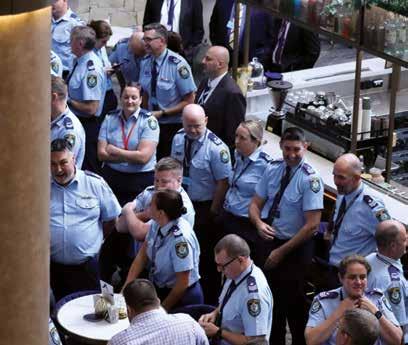
The scheme launched in January 2022, with the second round seeing an oversubscription from police officers seeking to disengage. The third and final round is set to be completed in January 2024.
Blue tape
Delegates were very passionate about changes to ‘Blue Tape’ including the culture of duplications, working with poor technology and excessive nonessential tasks, which all need to be reviewed to allow police to return to their core activities.
The PANSW is heavily involved in several working parties with NSWPF, focusing on all areas of Blue Tape, including technology, equipment, policy amendments and legislation and will provide members with further updates as these progress.
■ Other motions relating to the Concessional Cap (which members have been updated on recently), equipment, the provision of training, uniforms, prisoner transport, promotions, injury management, DNA samples and parking/ tolls remain active and continue to be worked through.

PANSW Police News Sept-October 2023 7 CONFERENCE WRAP

REFORM 8 PANSW Police News Sept-October 2023
Angus Skinner PANSW Manager of Member Engagement
A system failing everyone
Is the mental health system about to be reformed?
■ A mother provides regular care for her adult child, who has a history of mental illness. One night she is concerned for his welfare and believes he needs to attend a medical facility to receive treatment and be kept safe. She calls 000.
It is late at night so personnel from the PACER program are unavailable. A police car is the first to arrive in their street. Police make a call to see if a health vehicle is available to transport him to an Emergency Department and find that there isn’t one available. The police have no other option but to enter the house.
The presence of uniformed police causes him to become agitated, which escalates the situation. He is yelling and will not voluntarily be transported to the Emergency Department. Without another option available, police officers are required to transport him against his will. He resists which requires police to use force to restrain him.
He is lead from the house, yelling and struggling, and placed in the caged police vehicle. This occurs in full view of their neighbours.
The officers then drive a number of hours to the nearest hospital that is a declared mental health facility. For much of the drive, police can hear him banging into the walls of the
The experience of the mental health system: why does it so often start with police?
Too often, police officers are the first and primary contact point between a person in mental health crisis, and access to support and treatment.
Too many people who need an ambulance or a mental health bed are instead staying in a police car or a police cell.
Too many people who need mental health support instead get police officers who are trying their best, but for all the valuable and unique skills sets police officers possess, we are not doctors, nurses or mental health experts. Our attendance at these incidents is not the best option for anyone;
• not for people that need support or treatment from mental health experts but have police attend instead,
• not for the community who have reduced service from their local police
police vehicle as he becomes more agitated and scared.
They arrive at the facility, but the facility is not ready to receive him. He is required to wait in the back of the police vehicle. He has now been in the vehicle for hours.
By the time he is accepted by the facility, he has been apprehended against his will and transported in a vehicle not fit for that purpose. He is traumatised and agitated, and his loved ones are upset and worried. At the end of the process, he is dissatisfied with the health services accessible anyway. At the same time, that community has spent hours with reduced police coverage. With car crews completely tied up responding to mental health incidents, the Command is not sufficiently staffed to conduct core policing work, like responding to urgent calls for assistance, detecting and preventing crime.
The police officers that attended the scene are stressed and potentially traumatised: they just had to resolve a situation that really requires clinical skills to support a person with mental illness, not something police are trained to do. They are aware that the situation could have gone worse, to the point it could have ruined the lives of everyone there. This is one of multiple such incidents they will attend this year.
who spend entire shifts performing mental health roles rather than preventing and detecting crime, and • not for police who have to attend incidents and provide services that is not within their responsibility or training, in circumstances are disproportionately represented in dangerous critical incidents.
Police officers around the world, including the PANSW, have been calling for solutions to this for years. And it seems governments are starting to listen.
United Kingdom commences major overhaul for mental
health incidents.
The UK solution to the major challenge of coordinating police and health services has hit international attention in May this year when the Commissioner of the Metropolitan Police, Sir Mark Rowley wrote a letter to all health and social care services, giving notice he would direct
his police officers to stop attending certain mental health related incidents by 31 August.
While it was the Met’s actions that gathered international attention, we have to go back to 2019 for the origins of this solution.
Humberside Police
Humberside Police is about the size of a Region in NSWPF; approx. 2,000 officers.
In 2019, they were at dangerously low staff levels after years of austerity cuts.
At the same time, they were receiving 1,566 incidents per month about concerns for welfare, mental health incidents or missing persons. Estimates equated this to approximately 11% of police officers’ workload.
75% of the calls they received to attend mental health incidents were not from the public, but from other government agencies or care providers.
Police were constantly being called to apprehend a person, and then
PANSW Police News Sept-October 2023 9 REFORM
sometimes having to hold them for 16 hours while a mental health bed was found.
This stretched police resources that were already cut to the bone.
Humberside Chief Constable Lee Freeman implemented what is now known as the Right Care, Right Person (RCRP) model that is now underpinning the entire UK reform.
By only deploying his officers to incidents that required police, and diverting the rest to health services, Chief Constable Freeman estimates Humberside Police reduced the number of mental health incidents that police attended by over 500 per month, saving 1,132 officer hours each month.
In a police force the size of a NSWPF Region, that makes a big differenceHumberside Police were able to redeploy those officers to core policing duties, and the results were significant for the community:
• They formed teams dedicated to disrupting drug dealing,
• Humberside Police quickly achieved the highest crime detection and arrest rates in the UK, and
• Humberside won the ‘UK Police Service of the Year’ award in 2022.
Jump forward to London in 2023.
London Metropolitan Police
With over 34,000 sworn police, the London Metropolitan Police is the largest police force in the UK.
In Commissioner Rowley’s letter in May 2023, he outlines to health services that Met police officers spend 10,000 hours per month dealing with mental health issues. To demonstrate the point, he showed the urgent response call data from a day where the Met received a record number of calls; 9,292 calls, only 30% of which were categorised as crime related.
In his letter, he says:
“We are failing Londoners twice. We are failing them first by sending police officers, not medical professionals,
to those in mental health crisis, and expecting them to do their best in circumstances where they are not the right people to be dealing with the patient."
“We are failing Londoners a second time by taking large amounts of officer time away from preventing and solving crime, as well as dealing properly with victims, in order to fill gaps for others.”
Commissioner Rowley notified health services that on 31 August, he would direct his police officers to cease responding to emergency calls related to mental health, unless there is a real and immediate risk to life or serious harm.
Initially, health services were resistant to the move, concerned they could not coordinate the resources necessary to take over that work from police officers, and were worried it would leave people with mental illness without any response to assist.
But the Met Police had expert legal advice that there was no legal obligation for the police to perform that work, meaning any legal challenge by health services would be unsuccessful.
Since then, health services have been highly cooperative, getting around the table with police to work out a plan to transition the work from police to health personnel.
The deadline of 31 August has been extended to 31 October, and the implementation will be phased.
The plan is built around the Right Care Right Person model developed in Humberside.
And now the UK has adopted the Right Care Right Person model as a national agreement.
Right Care, Right Person
“When people are in mental health crisis, they need timely access to support that is compassionate and meets their needs … police are increasingly involved when they are not the most appropriate agency to respond, and they are not able to handover care to a more appropriate professional in a timely manner. This
impacts on the ability of the police to carry out their other duties effectively, and importantly, can result in people with mental health needs experiencing greater distress and having poorer experiences of the mental health care pathway.”
UK - National Partnership Agreement: Right Care, Right Person (RCRP)
At its core, the RCRP is a decisionmaking tool to determine when police should attend a call relating to a person with mental illness, or when a health service should be responsible. The express purpose is to reduce the number of incidents that police attend and increase the number that are handled by health services.
The threshold for a police response to a mental health-related incident is:
• To investigate a crime that has occurred or is occurring; or
• To protect people, when there is a real and immediate risk to the life of a person, or of a person being subject to or at risk of serious harm
There is a phased approach to ceasing police involvement in:
• Initial response to people experiencing mental health crisis.
• Responding to concerns for welfare
• Persons going missing from health facilities, and
• Transport of patients in police vehicles. To improve mental health services, the objective is also to ensure universal access to 24/7 advice, assessment, and treatment from mental health professionals, and address delays of handover to health facilities.
After the initial concerns from health services, health services are supporters of the principles of RCRP, even if they still hold concerns they do not have the resources to pick up the workload.
The RCRP has been expanded into a national agreement, with local police
10 PANSW Police News Sept-October 2023 REFORM
"We are failing Londoners twice - by sending police officers, not medical professionals to those in mental health crisis,
and health authorities now responsible for implementing the agreement within their community, developing working arrangements and timelines that meet their local needs.
It is crucial to the success of RCRP that health services have been brought onboard and develop working arrangements with police. That is required to ensure they meet the demand, and the calls don’t just fall through the cracks for police to pick up the pieces after all.
The signatories to the national agreement include the Mental Health Director of the National Health Service (NHS) and the Parliamentary Under Secretary of State for Mental Health.
What is happening in NSW?
The challenges facing Humberside and the London Met probably sound very familiar to police here in NSW: already understaffed Commands devoting a huge amount of police time to responding to mental health incidents. Whole communities are left with reduced police coverage as officers spend entire shifts attending mental health incidents, transporting people to health facilities, and waiting at hospitals when health resources are not available.
Police officers are also highly concerned because they are not mental health experts: they are responding to people who need health services, but instead have uniformed police attend. This escalates the situation, increasing the danger for everyone involved.
No matter what people in the media or parliament say about mental health training or the PACER program – those strategies are inadequate as they do not fundamentally change the status quo; they still rely on a police response to people that need a health service.
It is then a huge blow when police officers do their best to perform a job they are not trained to do, that should be done by another government service, and yet they face intense criticism from the Coroner and the media, that impacts
their careers, their own mental health and their lives.
Recent perspectives
The PANSW wrote an article about this in the July 2023 Edition of Police News Magazine.
You can review that article here:



Mental health crisis … and police asked to pick up the pieces
to have police stop attending any of these mental health incidents. Health should take over.” President Morton said. “We have tried to do the right thing … we have had enough. Whenever there is a critical incident at the coroner’s court and there is some element of mental health about it, it seems only the cops are put under the spotlight.’
PANSW President Kevin MortonPolice sick of copping it at coronial inquests

In response to the PANSW article, there was a flurry of political support. Rod Roberts made an impassioned speech in NSW Parliament, urging people to “not fall into the trap of placing the weight of the world on the thin blue line while washing everybody else's hands of responsibility.”

Rod Roberts - stands up for police in NSW State Parliament
As a result of President Morton’s advocacy, NSW Premier Chris Minns is reportedly sending a contingent of senior NSW police officers to the UK to understand the model being implemented there.
Minns is said to be considering following in the UK’s footsteps. Police want to keep people safe, and will do everything they can to do so, no matter the challenges.

For years, we have been saying that for the health and safety of people with mental illness, and police, it is time that mental health experts take responsibility for mental health incidents.
It seems the NSW Government is finally listening.
This was quickly followed by NSW Minister for Police Yasmin Catley and Commissioner of Police Karen Webb APM addressing the PANSW Commissioned Officers’ Branch promising to review police involvement in mental health incidents.
PANSW President Kevin Morton again went into bat for members, publicly calling on the Government to make this a health issue, and to pull the Coroner in to line. “Like the UK, we call on all sides of government, all sides of the parliament,
PANSW Police News Sept-October 2023 11 REFORM
... and by taking large amounts of officer time away from preventing and solving crime"
In the past five years, 68 NSW Police Force critical incidents have involved interaction between a person in a mental health crisis and police officers. That constitutes 43 per cent of all critical incidents.

12 PANSW Police News Sept-October 2023 PARLIAMENT
HON. ROD ROBERTS MP (INDEPENDANT) WAS A WELCOMED GUEST AT PANSW's COMMISSIONED OFFICERS DINNER, AUGUST 2023.
In Police Conduct
When an entire system fails so many people, why are only police to blame?
■ The Hon Rod Roberts delivered the below speech in the Legislative Council on 3 August. The speech was an important reminder of the role that police play as 24/7 responders and problem solvers in our society:
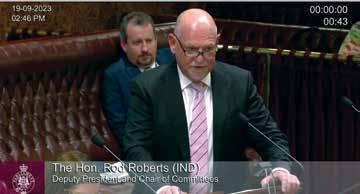
"Earlier this year on 25 May two police officers were called to a suburb in Northern Sydney after reports of a man armed with two knives who had been threatening people in the area. Upon arriving at the scene, police say the man was holding chef-style knives and rushed towards the two officers, forcing them to draw their weapons and fire, fatally wounding him. An investigation into the incident is now oversighted by the NSW Law Enforcement Conduct Commission, with The Guardian newspaper reporting that investigators will look into why officers chose to use firearms as opposed to tasers. The NSW Police Force's Assistant Commissioner Leanne McCusker stated at the time that with the information available, and the speed at which the man had approached police, she was confident that the officers had taken the correct course of action. Investigators have told the family they believed the man had slipped into psychosis. This was a tragedy on every level, for the life lost, the family of the man, those who knew him and the community. It was also a tragedy for the police involved. Take it from me, no police officer goes to work wanting to use their firearm.
Sadly, there are lots of stories like that.
In the past five years, 68 NSW Police Force critical incidents have involved interaction between a person in a mental health crisis and police officers. That constitutes 43 per cent of all critical incidents. That prevalence has led to a wave of criticism directed towards individual police officers and policing in general. Armchair analysts like to call into question police officer's training
on mental health, their use of tactical options and de-escalation techniques. We must always strive to do better, but the continued barrage of criticism, media attention, speculation and constant calls for inquiries helps nobody. I suggest it whiffs of being anti-police. On the extreme end, radicals who spend their entire career opposing mainstream power structures like those of the Police Force now disingenuously cover their police criticisms with faux moralising.
is utterly outrageous that the burden of responsibility is placed solely on the shoulders of our officers and not on any other part of society.
Where is the investigation into the increasing prevalence of mental health episodes in such events? Where is the scrutiny of NSW Health? Where is the investment to prevent such breakdowns?
Even well-meaning critics who simply call for more mental health training miss the mark by suggesting that the problem is simply a police one. It is not. It is a social problem.
As an example, when Ms Sue Higginson of The Greens called for a parliamentary inquiry into police powers and responses when dealing with vulnerable people, it showed either an almost insulting misunderstanding of the Police Force's role in mental health or a deliberate attack on the people who protect us. Police officers are not mental health professionals. They are protectors of the community and upholders of law. They should be the last resort in any mental health situation, as they were in the current incident.
They do an extremely difficult job for little thanks and little compensation. Sometimes, tragically, they have to use their firearms and, rightfully, those incidents are investigated. But to me it
Community protection comes in many forms. While The Greens and the Legalise Cannabis Party promote the use of marijuana, pill testing and the legalisation of cocaine, perhaps they should consider the mountains of evidence that suggests such drugs can trigger psychosis and worsen mental health episodes. Next time they call for an investigation into a tragic critical incident involving mental health, perhaps they should investigate if drugs were a contributing factor, and perhaps they should investigate their own policies. We must not fall into the trap of placing the weight of the world on the thin blue line while washing everybody else's hands of responsibility. We must not be armchair analysts, faux moralists or hypothetical crime fighters. When it comes to mental health, responsibility falls on the community and society, on all of us, not just the brave police officers who go to work every day risking their lives. I end with the words of the Police Association of New South Wales, which I think capture the issue perfectly:
Police are the universal 24/7 problem solvers. But they are increasingly being asked to do the work of other agencies and professions, often in dangerous circumstances. And then individual officers and the policing profession are being criticised when those dangers occur. So why is the entire system failing so many people, but only police are to blame?
Why, indeed."
PANSW Police News Sept-October 2023 13 PARLIAMENT
PRIOR TO ENTERING PARLIAMENT ROD WAS A DETECTIVE SERGEANT WITH THE NEW SOUTH WALES POLICE FORCE FOR APPROXIMATELY 20 YEARS.



Police Association of New South Wales employees who purchase an eligible Bupa policy will have access to special corporate rates and fantastic benefits from Bupa: • Accident Happen refund for selected products* • 100% back on your first massage, physio and chiro services on selected products, up to yearly limits** • Kids Gap free on most dental, Physio, chiro, podiatry Consultations, for selected products at Members First Providers, up to yearly limits*** Contact us today to learn more or scan the QR code to join or get a quote. Unlock your corporate benefits *Available on Corporate Basic Plus Hospital, Corporate Bronze Plus Hospital, Corporate Silver Plus Mid Hospital, Corporate Silver Plus Extensive Hospital and Corporate Gold Hospital. Accident definition: An unforeseen event, occurring by chance and caused by an unintentional and external force or object resulting in involuntary hurt or damage to the body, which occurred in Australia, which requires, within 72 hours of the event, medical advice or treatment from a registered medical practitioner other than the policy holder and, if necessary, any further medical treatment where such admission (including any readmission) or treatment must be within 180 days of the event. **Excludes physiotherapy classes and group sessions, and chiropractic X-rays depending on level of cover. Waiting periods, fund and policy rules apply. ***For most items covering dental, physio, chiro and podiatry consultations. Available on Corporate Benefits 60, Corporate Benefits 70 and Corporate Benefits 80, when taken with hospital cover on a family membership. Waiting periods, fund and policy apply. Child dependents only. Excludes orthodontics, orthotics and hospital treatments. Call us on 1300 662 074 Scan the QR code to join or get a quote Visit a Bupa Retail Store Terms and conditions apply
Industrial Updates
Public Holiday Rostering: PANSW negotiates update to SOPs.
We have received enquiries regarding rostering arrangements for Public Holidays following the Full Court decision that was handed down by the Federal Courts in the matter of Construction, Forestry, Maritime, Mining and Energy Union v OS MCAP Pty Ltd (2023) FCAFC. This decision means that all Employers (including NSWPF) cannot unilaterally roster an employee to work a public holiday without making the request to work and for then for consideration of reasonable requests from workers to not work.
The PANSW has been in negotiations with NSWPF since the publication of the decision which applies to all Employers in relation to the NSWPF updating their current rostering practices concerning public holiday rostering. NSWPF have now updated their rostering practices and SOP’s, on 18 August a nemesis was sent to all officers.
Whilst it is likely to be reasonable that an emergency services employer can require some employees to work on a Public Holiday, the outcome of this decision now requires further steps to be undertaken to protect the rights of employees.
The advice of the PANSW is:
• Officers can be requested to work a public holiday
• This can be presented in the form of a draft roster with a clear indication that officers can submit a request NOT TO WORK the public holiday within that roster period
• This request must outline the reasons for not wanting to work - see s.114(4) Fair Work Act 2009 (referred from s.7 Public Holidays Act 2010 NSW)
• This request must be reasonably considered by the NSWPF and a response provided to the officer
• The roster is then determined and published
In that roster the NSWPF may require an officer to work the public holiday, if they have first been requested to work and do not have reasonable grounds to refuse
Please note, any request will still need to follow the usual local process of reviewing the grounds for the request, with due consideration to be given to the reasons whilst balancing the operational needs of the command.
The PANSW will continue to monitor the implementation of this process in line with the decision for the upcoming public holidays to ensure consistency and fairness is being applied. We have seen Commands and Districts already amending their rostering processes to proactively fit this new process in giving officers sufficient notice and opportunity.
not consulted about these changes. We were unaware of them when the new provisions were forwarded to Professional Standards Managers across the state for communication and enforcement. This lack of consultation has forced this organisation to intervene to protect its members retrospectively.
The PANSW immediately reviewed the amendments, giving us great concern about the impact and onerous process this will have on thousands of members involved in social “punters clubs” often with a group of friends, whether with other Police Officers or civilians. In our view, having to disclose this information to the NSWPF was a significant overreach and unnecessary.
This is an attempt to control what our members do in their personal lives. At a time when police are stretched thin, the completion of more forms and disclosures is a complete and utter waste of the time of the hard-working police who should be focused on doing their job.
As a result of extended advocacy by the PANSW on your behalf last week, I am happy to inform members that all references to “Punters Clubs” have been removed from the Procedures for Managing Conflicts of Interest, and members will not be required to declare or disclose membership of such groups.
Invasive 'Punters Club' and other provisions removed from Procedures for Managing Conflicts of Interest following PANSW intervention.
The PANSW were made aware of changes made by the NSW Police Force to policies surrounding Declarable Associations, secondary employment and new obligations which were to be placed on members to declare involvement in what is commonly known as a “Punters Club” or the financial interest in a racing animal.
Disappointingly, the PANSW was

The PANSW has also had the policy around ownership of “Racing Animals” modified, including the removal of a need to disclose any members of “public syndicates” such as a small individual share in a horse via an established syndication company and the use of conditional approvals preventing members from missing out on a particular purchase due to potential delays in any approval process.
This policy is an example of how consultation with the PANSW as per the consultation requirements as a key stakeholder is crucial on behalf of our members. We are here to ensure that policy amendments are in the best interests of our members and do not create an impractical situation that is impossible to implement. Common sense has to be applied.
PANSW Police News Sept-October 2023 15 INDUSTRIAL
MAN'S LOVE OF FAST ANIMALS PREDATES MODERN CLOTHING / AGNSW
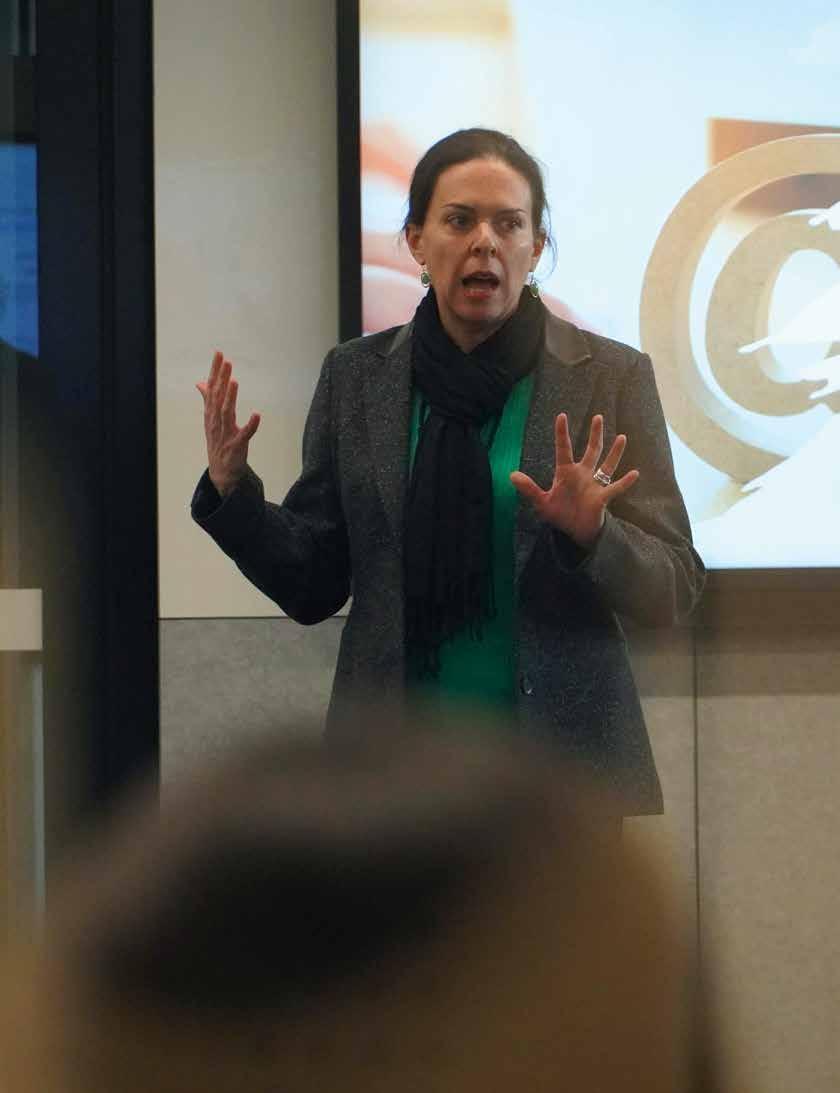
16 PANSW Police News Sept-October 2023
PROFILE
DR LINKLATER LECTURES IN POLICING AT WESTERN SYDNEY UNIVERSITY. WITH OVER 150 STUDENTS ENROLLED IN EACH YEAR THE COURSE HAS BECOME A TARGET FOR AUSTRALIAN LAW ENFORCEMENT RECRUITERS.
Elyssa King PANSW Media & Communications Officer
The unexpected doors that open
Curiosity led Kate Linklater into policing, then on to University.
■ It is no secret that Kate Linklater advocates for the significance of ongoing education. With 23 years of experience as a police officer behind her, it's fascinating to reflect and see how all her passions have intersected.
"It's interesting that all my research has been on police culture because that is why I joined … because I wanted to be part of that."
From her time at the Academy, the subjects that stood out to her the most during her time in Goulburn were those linked to communication, from delivering death messages to how to de-escalate conflict. Developing those interpersonal skills has held her in good stead in interactions on the street and navigating the workplace. The theory behind criminal law was a mystery that she would begin to understand through practical application as her career progressed.
Attesting from the Police Academy in 1999, she enjoyed the variety in the job during her time in General Duties at Granville.
In the early years of her career as a police officer, continuing to expand her mind was motivated by the desire to chase a cerebral challenge. In pursuing academic fulfillment, following an interest always proved to be a more rewarding path than anything that would guarantee a promotion. During the early years of her career, she was fortunate enough to spend time travelling in Vietnam while studying the language.
"I had a huge passion for learning about different cultures and the power of learning another language and how that gives you a new lens to view the world through."
"It enhanced my ability to think during interactions about 'how do you feel when I speak to you like this?' or 'what
is going on in your head right now?'. I gained a deeper appreciation for how we all think differently and that our cultures don't see each other in the same way." She believes that the experience made her a better police officer.
Returning from Vietnam with plans to begin a translation degree, she completed her Bachelor of Policing from Charles Sturt University via Distance Education as the first step to opening the post-graduate pathways she wanted to follow.

future work in the research space. Stepping out of the work environment also allowed her to identify a skills gap in her policing work and inspired a return to LAC work in the Detective's office at Fairfield.
"Both times when I applied for leave, I was fortunate to have a boss who understood the merit in taking the time off. In academia, you're entitled to a career break every three years to go and study for six months with no teaching at a different University. If I could implement one thing, it would be career breaks because I think we would end up with happier, more innovative people as a result."
The trajectory to this point had not been linear or planned, but there is something to be said for curiosity and capitalising on opportunities when they present themselves. The move to Fairfield presented an unforeseen opportunity. On a training course one day, Kate ran into an old colleague who had begun teaching policing at Western Sydney University. Intrigued by the possibility of trying something new, questions were posed, a connection at the academic institution was shared, and another unexpected doorway opened.
Ever the student, Kate finished her Detectives Course while working at the South East Asian Crime Squad before transferring to the Fraud Squad. Sitting in a car for hours doing surveillance led to the next educational pathway in completing a Master's Degree in International Studies, motivated again by a wish to broaden her understanding of other cultures combined with a love of travel.
A study-related trip to France would have significant implications for her
She began teaching policing theory and practice, teaching students the foundational skills in analytical problem-solving with a mix of practical application.
The culmination of her interests led to a professional desire to more closely examine how to make police officers from all different backgrounds feel more included in their workplace.
Her doctoral thesis was a study on police culture, focused on perceptions and experiences of difference and diversity in the workplace. With a strong influence from French social capital
PANSW Police News Sept-October 2023 17 PROFILE
DR LINKLATER TEACHING AT WSU'S LIVERPOOL CAMPUS
theorist Pierre Bourdieu, the result was a framework to assist management in tailoring policy and strategy that increases inclusion for all employees.
Applying this critical thinking to her position as a Research Officer within the Police Association of NSW has seen Kate contribute to the development of several different models to facilitate flexible workforce allocation and deployment to meet demand and community needs.
After years of advocating by the PANSW Industrial Team, a relief pool for police officers is currently being trialed with the NSWPF. This concept acknowledges that greater leave and resource flexibility is required for some police officers, to increase operational capacity by creating opportunities for officers working reduced hours or who may be out of the workplace on parental leave or other long-term forms of leave.
Attending one of her classes allows me to see Kate operating in her academic element.
The students immediately pay attention when she shares her background before ensuring they understand the requirements for an upcoming assignment. She introduces me to one of her interns, who enthusiastically hangs off her every word.
Every year, there are hundreds of students that enroll and graduate in policing studies and criminology degrees at Western Sydney University and other universities in NSW. These young people are committed to furthering their knowledge about policing, and many are passionate about becoming a police officer.
Kate has created recruitment opportunities for the NSW Police Force to draw on this pool of committed young people to become the police officers of tomorrow.
At a time when recruitment is a major challenge for police forces in NSW, around Australia and the world, these pathways may be very important. With recruitment front of mind, the University provides another pathway for potential new recruits to enter the NSWPF. To help create this pathway, Kate has made this connection with the NSWPF, with opportunities for recruitment days offered to tap into the well of potential new recruits.
So, do the students have any questions about the assignment?
No one raises their hands, so I save mine for when we're back at the office.
As an observer who understands the many hats she wears, it's intriguing watching her intertwined professional lives collide.
Recruitment and retention are key issues in any discussion related to policing now. When we consider the full life cycle of employment, ongoing education isn't just important for police
officers looking to improve their standing throughout their career, but for those considering what their future will look like afterwards.
Having resigned from the NSWPF last year after more than two decades in the job, Kate considers herself fortunate to have landed on her feet in this regard. She is conscious that her pursuit of knowledge paid off, but admits that it was in no way planned.
Increasingly, many police officers may find that they come to a stage in their careers where they have achieved what they want to and are interested in exploring other opportunities. It's important to consider your options before you get to the stage where you decide that you want to make that change.
"I accidentally set myself up for a career change at the end but that isn't going to happen for everyone. It's too late to be thinking about 'what am I doing next?' when you already want to go."
Given her own experience, Kate is a huge believer in the benefits of completing a Bachelor's Degree to lay the foundations for further study and exploring your interests at a postgraduate level. Obtaining a tertiary qualification can make the professional transition more seamless.
Her sage advice?
"Anytime I've studied something because I thought it would get me somewhere, it didn't. Follow your passion and the doors will open there."
18 PANSW Police News Sept-October 2023 PROFILE
FELLOW FORMER POLICE OFFICER BEN LEE, TEACHES ONE OF DR LINKLATER'S CLASSES, LIVERPOOL CAMPUS, SEPTEMBER 2023
Anytime I've studied something because I thought it would get me somewhere, it didn't. Follow your passion and the doors will open there.

PANSW Police News Sept-October 2023 19 PROFILE

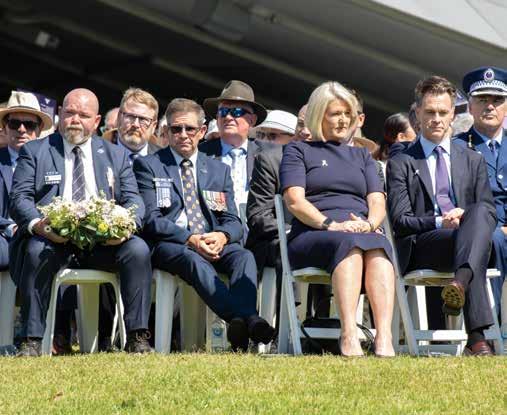
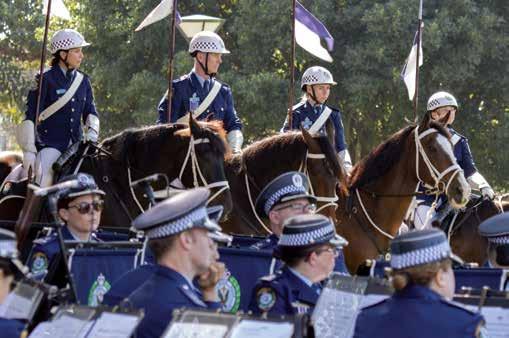

20 PANSW Police News Sept-October 2023 SEPTMEBER 29, 2023 SYDNEY: TO MARK NATIONAL POLICE REMEMBRANCE DAY, FAMILY, FRIENDS AND COLLEGUES GATHER IN SYDNEY'S DOMAIN TO REMEMBER LOVED ONES NO LONGER WITH US. NATIONAL POLICE REMEMBRANCE DAY / SYDNEY 29/10/23

PANSW Police News Sept-October 2023 21 NATIONAL POLICE REMEMBRANCE DAY / SYDNEY 29/10/23
HEALTH INSURANCE MADE FOR YOU
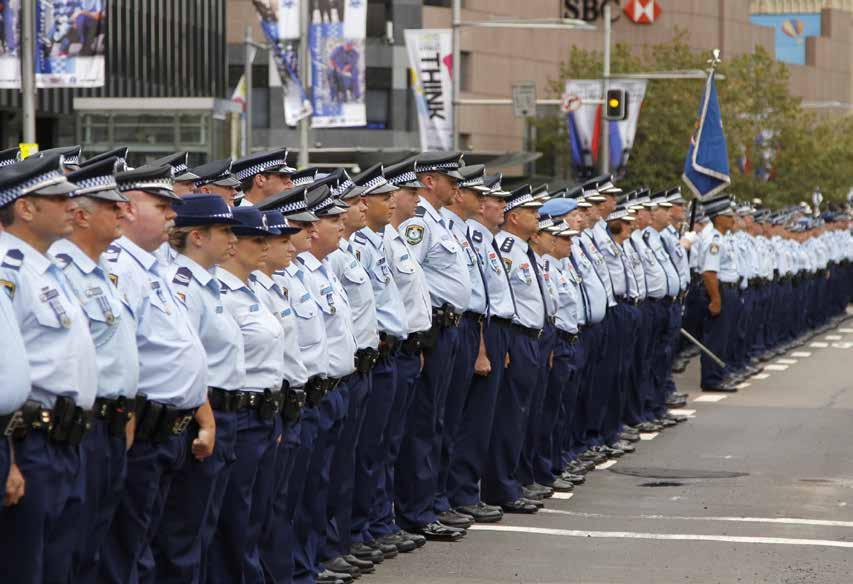
Join more than 75,000 members of Australia’s policing community at the health fund that’s run for police, by police since 1935. As a not-for-profit provider we specialise in top-level cover, providing great value for money and complete peace of mind. Our hospital cover has no excesses, exclusions, or co-payments and we pay 80% back on most Extras services * Our fund was voted #1 of all private health funds in Australia in these categories.^ Police Health Limited ABN 86 135 221 519. A registered, not-for-profit, restricted access private health insurer - first established in 1935. © Copyright. *Subject to waiting periods, annual limits and other conditions. Providers must be recognised by Police Health. ^IPSOS Healthcare & Insurance Australia research survey conducted in 2021. Scan the QR code to compare our cover or call us on 1800 603 603 for more information.
joining.
joined then.
Police Health are proud to support National Police Remembrance Day 2023 to commemorate the police officers who have made the ultimate sacrifice to protect the community.
“ The best i have
had
and i have no regrets
If I was aware earlier, i would have
” John, NSW
Strength in Unity
Leo Solomon PANSW Industrial Officer - Northern & NW Metro Regions
■ PANSW Branch Officials from across the Northern Region gathered in the serene landscape of Hunter Valley for a productive and informative Police Association of New South Wales forum. The event held on Wednesday 19 July saw a diverse range of topics discussed and addressed, reflecting the commitment of the PANSW Branch Officials to fostering effective communication and addressing issues facing the region.
To best utilise the limited time together, the day prior saw the completion of branch focus training for more than 15 new Branch Officials in the Northern region. The dedication of the Branch Officials to their members ensures we have a functioning Police Association that understands and addresses issues for each branch.
The forum kicked off promptly at 8:15 am the next day with Branch
Officials and attendees gathered at the well-attended forum, with more than 30 attendees. It was a moment for networking and setting the stage for the day ahead. The official proceedings began with a passionate address from PANSW President Kevin Morton at 8:30 am. President Morton highlighted the importance of unity, proactive engagement, and collective efforts in ensuring the welfare of both officers and the community.
Following the President's address, Vice President Ian Allwood and Executive Members Paul Ireland (Northern 1) and Darren McCaughey (Northern 2) took to the podium to deliver their own insightful addresses, emphasising the significance of collaboration and joint endeavours together as a region.
PANSW Secretary Pat Gooley then spoke to the room about the pressing matter of Concessional Cap issues and
the ongoing campaign, outlining Your Association's stance and efforts. He then went through the current 'Protect Our Future, Fix our Super' campaign, and how the targeted Industrial Action was putting pressure on the Commonwealth to find a solution to the discriminatory and unfair issue that has affected so many members.
Member Support Coordinator Ian Johnstone followed, providing vital updates on the Welfare Scheme, which reinforced the Association's commitment to the wellbeing of its members.
The morning session continued with industrial updates presented by Northern & NW Metro Regions Industrial Officer Aileen Fleming and myself. These updates included discussions on significant issues including remote incentives, parental leave, the relief pool, and matters related to the Award and PBRI.

PANSW Police News Sept-October 2023 23 FORUM
The PANSW Hunter Valley Forum served as a testament to the power of dialogue and cooperation in driving positive change for PANSW members.
Organiser Glenn Price then took the stage to delve into the discussion of FRPA versus Proactive Workload, offering insights into this critical issue facing the region. Various other updates were then presented, covering topics such as the Rotation Policy, Northern Region Desirable Location, ODS (Overtime Directive System), and Public Holiday Rostering.
The participants then engaged in a workshop to formulate questions for the Northern Region Commander, encouraging a proactive approach to addressing pertinent issues. The afternoon session commenced with an address by Assistant Commissioner Peter McKenna, the Northern Region
Commander. McKenna's insights shed light on the region's overarching goals, challenges, and strategies.
Organiser Glenn Price then returned to discuss BWV (Body-Worn Video) issues, engaging attendees in a conversation about their significance and effective implementation.
Lead Organiser Jon Goddard then discussed the crucial topic of Blue Tape, highlighting the need to streamline processes for efficiency and effectiveness. The floor was opened to ideas from Branch Officials, with the following discussions highlighting the innovation that is required moving forward. Fantastic ideas came from Branch Officials across the room,
providing valuable data for Mr Goddard to take back to the NSWPF.
With the conclusion of the forum's official proceedings, attendees departed after enjoying a well-earned afternoon tea, armed with insights, connections, and a sense of unity, ready to take on the challenges and opportunities ahead.
The PANSW Hunter Valley Forum served as a testament to the power of dialogue and cooperation in driving positive change for PANSW members.
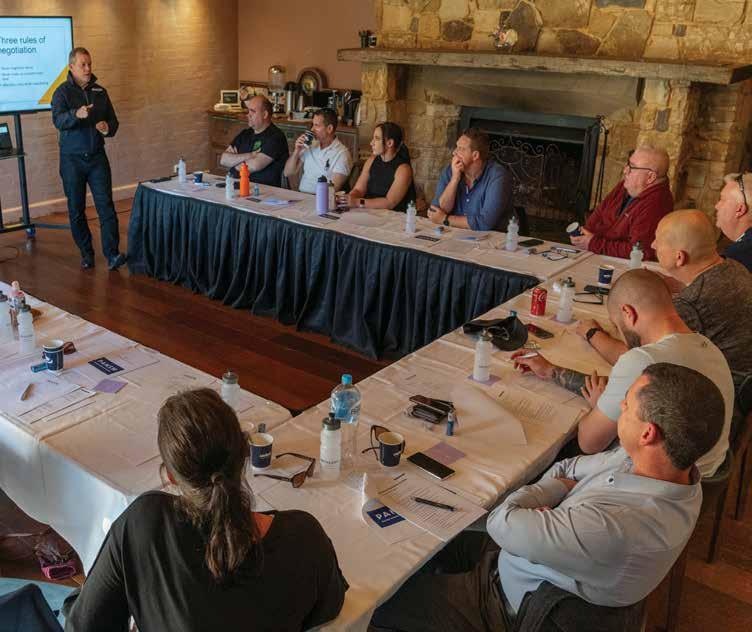
24 PANSW Police News Sept-October 2023
FORUM

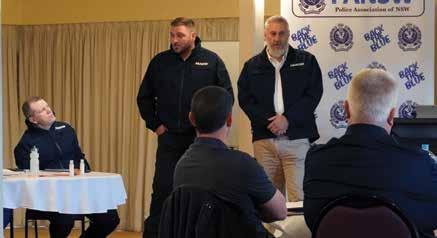
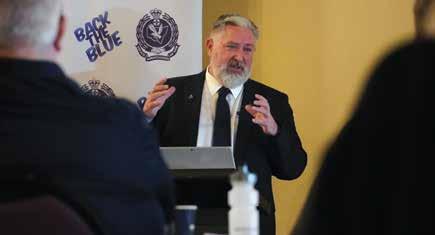
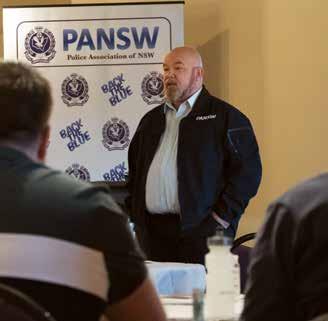
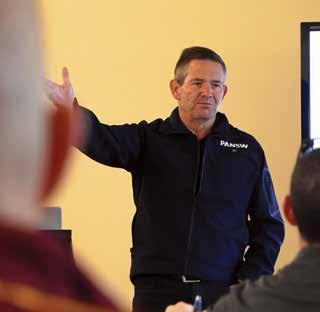

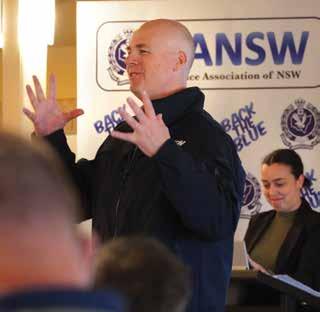
(CLOCKWISE
TOP RIGHT) ASSISTANT COMMISSIONER PETER MCKENNA, PANSW PRESIDENT KEVIN MORTON, PANSW LEAD ORGANISER JON GODDARD & PANSW INDUSTRIAL OFFICER AILEEN FLEMING, PANSW VICE PRESIDENT IAN ALLWOOD PANSW SECRETARY PAT GOOLEY, PANSW EXECUTIVE MEMBERS PAUL IRELAND & DARREN MCCAUGHEY, PANSW INDUSTRIAL OFFICER LEO SOLOMON. (OPPOSITE) PANSW ORGANISER GLENN PRICE TALKING ON THE BRANCH FOCUS DAY. PANSW Police News Sept-October 2023 25 FORUM
FROM
Inclusion criteria:
Physical injuries only (not psychological).
Suitable for work and non work related injuries.
Suitability/risk assessed* to wear full arms and appointments.
Able to work front counter in a police station.
Officers with lower torso injuries (ankles, knees etc) are deemed to be most suitable.
Officers with upper torso injuries are also eligible providing their ‘shooting hand’ is not compromised.
* A Command can make an agile suitability assessment based on medical information and safety considerations whether an officer can undertake IODs. In the event the command is unsure they can undertake a formal WHS risk assessment.

26 PANSW Police News Sept-October 2023 INDUSTRIAL
Internal operational duties for injured officers (physical injuries)
Kirsty Membreno PANSW Assistant Secretary – Industrial
■ Conference 2016 provided clear direction to the PANSW that securing ongoing employment within the NSWPF was a priority for members with injuries that may prevent them from returning to operational policing duties. The PANSW developed what was titled “Best Practice deployment of injured officers” which was served on the NSWPF at that time. An article was published in the August edition of the 2016 Police News magazine identifying the approach the PANSW was seeking engagement on. Since that time, we have advocated strongly through various working parties within NSWPF that greater flexibility and acceptance of risk is necessary to maximise capability within the organisation, particularly for police officers who may be carrying an injury or illness and are not at full capacity. This has been a slow burn, but after being trialled in the Northern Region and then other regional areas, the NSWPF have now approved the Internal Operational Duties for injured officers (physical injuries) approach giving greater capability to officers with injuries. The relevant Fact Sheet is titled Internal Operational Duties for injured officers (physical injuries ONLY) and should be referred to for officers seeking to remain operational with an injury. The Fact Sheet explains:
Recover at work
It is well documented that working has a positive effect on physical and mental health and through the provision of suitable employment, the NSWPF aims to support workers to recover at work. For more details about recovery at work process see NSWPF Injury Management: Return to Work Program.
Internal Operational Duties (IODs)
Internal Operational Duties aim to support officers who are recovering from a physical injury and assist Commands
to meet first response requirements. A Command, in consultation with an officer and injury management advisor (IMA), may consider that IODs may form part of a graded Recover at Work (R@W) plan where pre-injury duties is the goal and officers cannot be permanently restricted. Note: IODs are only appropriate for Internal Duties (Station and Administration) and arms and appointments cannot be worn outside the station. IODs can be considered at any stage throughout the R@W process.
Inclusion criteria
• Physical injuries only (not psychological)
• Suitable for work and non-work-related injuries
• Suitability/risk assessed* to wear full arms and appointments
Able to work front counter in a police station
• Officers with lower torso injuries (ankles, knees etc) are deemed to be most suitable
• Officers with upper torso injuries are also eligible providing their ‘shooting hand’ is not compromised.
Process
• Command identify suitable officer
• Discuss with officer whether they would like to participate in IODs as part of their R@W plan
• IMA seek approval from NTD or physiological for medical approval for officer to undertake IODs
• IMA provide treater modified task analysis (appendix A) and proposed graded R@W plan
• NTD or physic provide medical clearance
• Command determine suitability for officer undertaking IODs*
• Officer undertake R@W and this is monitored by Command and IMA
Monitor progress through IMPs
• Officer completes ROSA upon PID clearance
*A Command can make an agile suitability assessment based on medical information and safety considerations whether an officer can undertake IODs. In the event the command is unsure they can undertake a formal WHS risk assessment.
Modified duties performance assessment (MDPA)
An MDPA will be used if a Risk Assessment determines this should be needed to allow an injured officer to undertake IODs. MDPA are generally used for officers with upper torso injuries / arm injuries. The form identifies a range of tactical options in consultation with the NTD, Injured Officer and Commander. The relevant forms should be provided to an accredited Operational Safety Instructor (OSI). The OSI upon receipt of the MDPA will conduct a formal assessment of the injured worker relevant to the identified performance objectives as indicated in the MDPA form/s.
This new process is a positive step in the right direction for the NSWPF. The PANSW will continue to press for greater flexibility to enable the retention and deployment of officers with injuries. Undertaking work is good for you and if you can stay with the employer of your choice, doing the work that you enjoy, then this is what we should strive to achieve.
Any member who has suffered an injury or illness and requires advice on Recover at Work, injury management and rehabilitation and associated financial entitlements should contact the PANSW Head Office on 9265 6777 or info@ pansw.org.au for individual assistance.
PANSW Police News Sept-October 2023 27 INDUSTRIAL
If you are injured in a car accident, in a public place, or at work including PTSD you need to ensure your rights are protected and your entitlements secured.

Carroll & O’Dea Lawyers are experts in personal injury law and panel solicitors for the NSW Police Association. Call us today to find out about your legal rights.






28 PANSW Police News Sept-October 2023
NO OBLIGATION CONSULTATION 1800 059 278 enquiry@codea.com.au codea.com.au
you for keeping our communities safe! Have you been injured while on duty? Liability limited by a scheme approved under Professional Standards Legislation. © Carroll & O’Dea Lawyers Level 18, St James Centre, 111 Elizabeth Street, Sydney, New South Wales, 2000
Thank
Self-Managed Superannuation Funds + Academic Allowance
PANSW resolves secondary employment requirement
We have received numerous enquiries over the past few days following an email concerning Self-Managed Superannuation Funds (SMSF) and the requirement for members to make secondary employment applications and declare themselves as Directors of same.
The PANSW has made enquiries with NSWPF after analysing the Policy and can confirm that there has been no change to the NSWPF Secondary Employment Policy. There is no requirement to apply for secondary employment if you are a director of a SMSF despite some initial advice coming from NSWPF indicating you had to, THIS IS INCORRECT.
The new Conflicts of Interest Policy however DOES REQUIRE a declaration to be made if the SMSF (for which you're a director of) has ownership in a high risk industry. If the ownership is via owning shares on the ASX or Cboe, you're only required to make this declaration if you reach the major shareholder threshold for the exchange (usually a shareholding of 5% or more) for example a licensed premises.
Members need to be aware that there is no General requirement to submit a secondary employment application for conducting a general Self-Managed Super Fund under the Policy except in the above-mentioned high risk industry circumstances. The list of high risk industries can be found on the intranet.
The PANSW will continue to work in the best interest of our members, and when alerted to information concerning your rights or in this case privacy, we will make sure you are protected.
Professional Academic Allowance
Members may be entitled to claim the professional academic allowance if they meet certain criteria contained in clause 46 of the Crown Employees (Police Officers – 2021) Award.
The Award prescribes certain conditions for claiming this allowance. The member must hold a completed vocationally relevant degree or qualification. The relevance of such qualifications is determined by the NSWPF Tertiary Scholarship Committee on application.
The condition of granting this allowance is that the NSWPF must have not met any course fees, travel, or accommodation expenses. The allowance also is not applicable if the course/qualification was done during normal working hours, or using study leave (from the NSWPF).
The allowance is claimable only for members holding the rank of Constable (Including Senior Constable) however, it ceases once the officer reaches their first merit-based promotion (Sgt and above)
The entitlement is $398 per annum for the Diploma in Criminology $398 per annum, the Bachelor of Law Degree, the Associate Diploma in Justice Administration $792 per annum. All other qualifications entitle you to $792 per annum if determined vocationally relevant by the Committee.
Members should ensure also that their qualifications are recorded in the SAP. This allowance is available only upon application, it is not automatic. Members can obtain the relevant form on the NSWPF intranet.

2023 PANSW Police News Sept-October 2023 29 INDUSTRIAL
KIRSTY MEMBRENO, ASSISTANT SECRETARY - INDUSTRIAL, SPEAKING AT PANSW'S SPECIALIST FORUM, SYDNEY JULY

30 PANSW Police News Sept-October 2023 LEGACY
NSW Police Legatee Deb Anderson

■ “Being Blue is a way of life. Once you’re in it, it will never leave you.” It’s this final statement, delivered almost as an afterthought in a follow-up email, that sums up Deb to perfection. Everything that she’s done since meeting her husband in 1978 has been deeply, passionately, enmeshed in the world of policing, with all the ups and downs that entails.
That first meeting couldn’t have been better scripted if it had been in a Hollywood romcom. “Marooned with a girlfriend and a guy that couldn’t swim,” on Lion Island in Broken Bay, her future husband, Sergeant Alan Anderson, had to come to their rescue in a Police Marine boat.
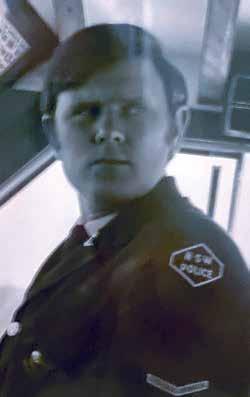
“I looked up at this big white boat coming, and I said to my girlfriend, Jeez I’d laugh my head off it that was the police. She said, I’ll kill you if it is.” It was. She didn’t. But the fateful meeting had taken place, and six years later they were married.
Deb and Ando (the only way she ever refers to him) moved into a house in
Avalon. It’s the house she lives in today. It’s the house she nursed her husband in, through his first bout of serious illness in 1994; it’s the house she watched him die in, after his second bout of serious illness in 1999. “I have no idea why he had to suffer so much – twice – before he got to move on to the next world,” she says. Other people might have taken the opportunity to move house. Not Deb. Her “boots and all” philosophy of life kept her there, through a tumultuous time in which she didn’t always cope well. She kept herself as grounded as she could through outdoor activities, including half-marathons, Mullumbimby to Brunswick Heads kayak paddles, trekking, squash, and basketball. Completing the circle, Ando’s ashes were scattered off Lion Island.
She lost her way for a bit before acknowledging she could use the support NSW Police Legacy could offer. “I was a bit scared to start with, not knowing what to expect… Now I’m in, boots and all.” She joined the Police Wives and Friends Support Group, aka
“The Bear Ladies”, where she found a warm welcome amidst a host of nonjudgmental women. “They bring an ease and calm to your situation without even saying anything.”
Alongside this introduction to the healing powers of NSW Police Legacy, Deb undertook Diplomas in Grief and Bereavement Counselling and End-ofLife Therapy and has been practising ever since. She relishes it. “It’s an honour to do this. It’s a pleasure,” she says, of helping Blue Family members in need of assistance.
In the meantime, she’s working parttime at a dermatology clinic, and a funeral home (where she loves the black humour) and looking to move more into counselling. She has a lot to give back and is now focussed and ready to do so. “Boots and all will do me, but sometimes it does take time to work out where your boots need to be.”
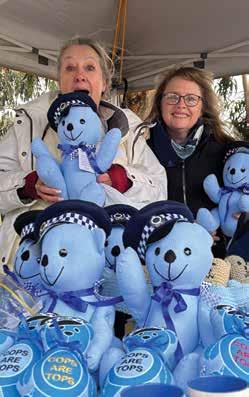 Tim Sinclair NSW Police Legacy Marketing and Communications Manager
Tim Sinclair NSW Police Legacy Marketing and Communications Manager
PANSW Police News Sept-October 2023 31 LEGACY
OPPOSITE: TOGETHER IN SICKNESS & HEALTH. - ABOVE LEFT TO RIGHT: A YOUNG DASHING ALAN ANDERSON / PROUD BEAR LADIES IN GOULBURN / PADDLING OFF AVALON IN HER MIRAGE SEA KAYAK
Steve Schausinger retires after 44 years service
Mick Timms PPN Writer
Albury Highway Patrol’s Sergeant Steve Schausinger APM has retired, bringing a 44-year career to a close. “Shoey” was honoured with a march-out at Albury Police Station on Friday 21 July 2023 which was followed that evening by a function at a local venue.

“I’d rather have a hotly contested court matter then do this,” Steve told PANSW Police News , after summing up the past 44 years in front of family and colleagues.
Steve Schausinger joined the New South Wales Police Force in 1979. His highway patrol service started two years later at Warilla, where he stayed for three years before moving further south. He would spend the next 39 years in and around the Murray River area, working at Albury, Deniliquin, and Holbrook.
Widely known for his skills in detecting drugs and other contraband in vehicle stops on the Hume Highway, Steve supported young driver education and worked with the heavy vehicle industry to improve road safety.
In the mid-2000’s Steve was at the tip of the spear of road policing strategies which succeeded in eliminating motorcycle road trauma in alpine region. Shoey was a mentor to many young highway patrol police who have gone onto higher rank. Four years ago, it was Steve’s turn to move up the ladder. Having completed 40 years of service, he was promoted to the rank of Sergeant.
This past January, Steve was awarded the Australian Policing Medal in the Australia Day Honours.
Most importantly, Steve has been a role model for his son, Senior Constable Cam Schausinger, who is making his own mark on the Hume Highway.
“I worked a few times with Cam, and we were able to do a couple of night shifts recently,” Steve said.
“We had some good shifts together and we have two court matters coming up to look forward to.
Steve was honoured with a special presentation held in the church, adjacent to Albury police station, attended by
current and former colleagues from Murray River Police District, and highway patrol from throughout the Southern Region and Wodonga (Victoria Police). Following the presentation, he was marched out and took his final salute from Superintendent Rob Toynton, Commander, Traffic South West, Traffic and Highway Patrol Command.
His association watch was presented by PANSW Organiser, Ms Nikki Lucaci, at the function held for Steve that evening.
PANSW Police News made a follow up call to Steve a few days after his march out to see how he was coping with retirement, only to find he was back on the road. This time though, Steve and wife Helen were heading to the north coast to spend some time together, with much more road-tripping to come.
“We recently ordered a new caravan which should arrive shortly,” Steve said.
From now on, the travel will be at a more sedate pace and there is no corporate fuel card.
32 PANSW Police News Sept-October 2023 ASSOCIATES
Class 135 / 50 years on
Sonia Roberts PPN Writer
The adventures of Class 135 after its members left the Redfern Police Academy in July 1973 could have easily made several movies.
Class members held their 50 year reunion in early July 2023 – marking their half-century almost to the very day they walked off the parade ground.

One of the reunion organisers, Greg Muir, said the 120 men and five women marched out on 2 July 1973.
“Of our class members, Vicki Spooner was a member of the gold medal winning Women’s Eights (rowing) at the Edinburgh Commonwealth Games, “Margaret White was one of four women - the first to be transferred to General Duties in 1976, stationed at Darlinghurst.

“Gary Ryan was one of the NSW contingent flown to Darwin after Cyclone Tracy in 1974.
“Another class member – Dick Westwood – won one of the first games of Lotto and opted for life beyond the badge.
“Others left early for family reasons and we often wonder how they have fared over the years.
“The last of us to disengage was Ray Filewood who retired as Superintendent after more than 40 years of service.”
When asked what he thought the members of Class 135 would say to the next class completing their training at the Police Academy’s Goulburn campus, Greg took a moment before responding.
“You don't get a medal for being the first car to an incident or crash, so drive safely. The lives of others are in your hands.
“Don't be afraid to put your hand up for help if you're affected by an incident. The strongest of police have been helped by talking to someone.
“Act in haste, repent at leisure. Always think about the consequences before taking action.
“The biggest thing we all learned was to support each other and stay in
touch,” Greg said.
Greg indicated the hopes for a gathering of Class 135 members to become an annual event and acknowledged there had been difficulties trying to locate a number of people.
Quite a few apologies were received from class members travelling overseas or interstate, as well as through ill health.
“We have lost quite a few members along the way, too many to name individually, but I should make special mention of the women from our class who are no longer with us - Vicki Spooner, Kim Guthrie and Rosalie Bashford (Sweeney),” he said.
PICTURE: CLASS 135 MEMBER VICKI SPOONER (SECOND ON THE RIGHT) AND HER TEAM MATES FROM THE AUSTRALIAN WOMEN’S EIGHTS WON GOLD AT THE EDINBURGH COMMONWEALTH GAMES. SOURCE – AUSTRALIAN ROWING HISTORY - HTTPS://WWW.ROWINGHISTORY-AUS.INFO
MEMBERS OF CLASS 135 AT THEIR 50 YEAR REUNION IN JULY THIS YEAR. THE 120 MEN AND FIVE WOMEN MARCHED OUT FROM THE REDFERN CAMPUS OF THE POLICE ACADEMY IN JULY 1973.
MAIN
INSERT:
PANSW Police News Sept-October 2023 33 ASSOCIATES
Two men, a 30 year old car, and 3300km of memories
Sonia Roberts PPN Writer
How many can truthfully say driving an almost 30-year-old car along approximately 3300km of roads in outback Australia is on their postpolicing to-do list?
Retired Detective Superintendent Mark Noakes APM can. Earlier this year he completed Box Rallies summer event travelling from Rockhampton to Hobart via Cobar in a 1994 Toyota Camry. Mark joined the NSW Police Force in 1985 and disengaged in March 2021.
Soon after his disengagement, he became a volunteer member of the four-person Advisory Committee for the proposed NSW Historical Police Museum. The other committee members are former Commissioner Ken Moroney AO, APM, MA and former Detective Chief Inspector Gary Raymond APM, OAM and former Senior Sergeant Wayne Pernice. There was another item of Mark’s retirement “to-do” list that needed to be crossed off – entering the Box Rallies. He rounded up close mate and mechanic Stewart Follows, plans were hatched and an entry submitted.
Team ‘The Drifters’ driving a Toyota Camry, raised a total of $9,340 for the summer rally. In total, the rally in March raised over $2.14m. Each team entered has to raise at least $5,000 before the rally starts, some teams raised more than $30,000.
“I first became aware of the rally about 10 years ago and thought that it would be a great, fun thing to do one day and it would help make a difference by raising funds for the Cancer Council.
“Like many others, I know or have known people who have been taken by cancer or who are living with cancer or beyond cancer. Some of those people were work colleagues, friends or adopted family.
“The statistics for cancer are confronting, in 2022 approximately 162,000 Australian’s were diagnosed with cancer and almost one out of every two Australians will be diagnosed with cancer by the age of 85.
“It’s estimated that over 1 million Australians are currently living with
cancer, or beyond cancer.
“The rally is the largest community lead fund raiser for the Cancer Council in Australia, with over $37m raised in the past 12 years.”
When asked if he would do the rally again, Mark’s eyes lit up at the thought.
with about 600 people from all sorts of backgrounds coming together was how well everyone got on with each other.
“Everyone was friendly and helpful and if one car broke down there would be 14 or 20 other cars stopping to help get it going along with the support crews coming along behind the rally with car trailers to scoop you up if needed.
“There’s around 240 vehicles in the rally – so there was definitely a few flat tyres and breakdowns along the way,” Mark said.
Mark acknowledged that if you were thinking about nominating for a rally, it was best to get your application in promptly as there was often a waiting list.
Even though it sounded obvious, Mark stressed the importance of giving your vehicle of choice a thorough going over prior to the event – especially the suspension.
The trusty 1994 Toyota Camry that carried Mark and Stewart from Rockhampton to Hobart ended up with tennis balls being put in its rear coil springs in the middle of nowhere after the shock absorbers decided to “take a holiday” in far western Queensland.

The Drifters will be on the road again for the 2024 Rally from Adelaide to Perth via Uluru. In honour of the route, the team name was changed to “Way Out West”.
He cited the camaraderie, working in small groups and dealing with the challenges from the rally course while driving an older vehicle as some of the highlights.
“It’s about being among a group of like-minded people wanting to make a difference and the support of others gives you a sense of purpose and lots of laughs over a lot of cold beverages!
“There’s an emphasis on taking dirt roads during the rally. What better way to get on the backroads and see the landscapes, small towns and small pubs of Australia and meet the locals you would never otherwise get to?
“The biggest surprise for me on the trip
One of the biggest mantras Mark adheres to in this phase of his life is trying to maintain, the at times elusive, work/life balance.
“You have to keep things in perspective; the average life expectancy in Australia is around the early to mid-80s.
“We all have things that we really wanted to do but haven’t been able to along the way.
“Your working life shouldn’t define your whole life. Stay connected with friends and family and get involved in things.
“You will make new friends along the way and create new memories. There are a lot of good people out there, go meet them,” Mark said.
To donate to “Way Out West” as they prepare for the 2024 rally head tohttps://autumn2024.shitboxrally.com. au/way-out-west
34 PANSW Police News Sept-October 2023 ASSOCIATES
BUSH MECHANICS APPLY HERE

PANSW Police News Sept-October 2023 35 ASSOCIATES
Why are former and serving police attracted to the Box Rallies?
Sonia Roberts PPN Writer
James Freeman OAM, Founder and CEO of Box Rallies said over the years they have had seven police officers (that they know of) take part in the rallies with one officer completing 10 rallies himself.
“The rallies are an incredible adventure for all backgrounds and often officers will come on the rally as part of their time off which is why we are unsure of the exact number who have taken part.
“We have always had a great relationship with police around Australia.
“I feel this is a big reason why we have officers who come on the rally in an off duty capacity - they see how it's run and the adventure that these projects are for those involved. It doesn't matter who you are or what your background is, raising funds for cancer research and exploring the wonders of the Australian outback is for everyone to enjoy,” James said.

2023 rally participant Mark Noakes said during the rally he met lots of people
from all sorts of backgrounds including some former police officers from various states along with former ADF members, current and former fire fighters, paramedics and the list went on.
“All of them were people doing things so they could stay involved and help make a difference.
“One former police officer I spoke to is now running a successful boat sales business in Queensland and loving life,” Mark said.
36 PANSW Police News Sept-October 2023 ASSOCIATES
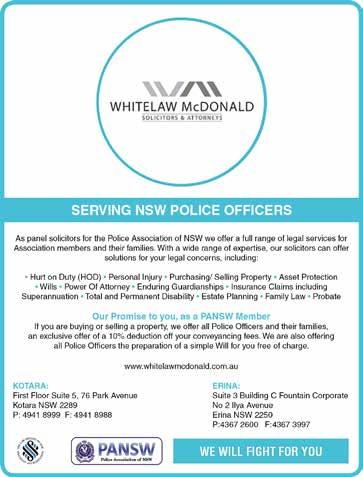
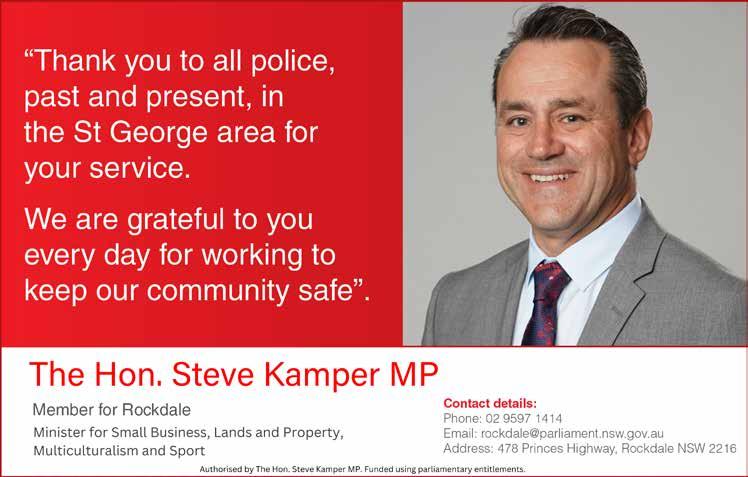

Expert mortgage support, with your local broker. Mortgage Choice Pty Ltd ACN 009 161 979 (Australian Credit Licence 382869) and Smartline Operations Pty Ltd ACN 086 467 727 (Australian Credit Licence 385325) are owned by REA Group Ltd. Your broker will advise whether they are a credit representative of Mortgage Choice or Smartline. Call Steve on 0411 184 884 today. Home loans Equipment & finance leasing Car loans Business loans Property investment Debt consolidation Steve Gregoire m 0411 184 884 e sgregoire@mortgagechoice.com.au w MortgageChoice.com.au/sgregoire We have now rebranded from Smartline to Mortgage Choice. PANSW Police News Sept-October 2023 37

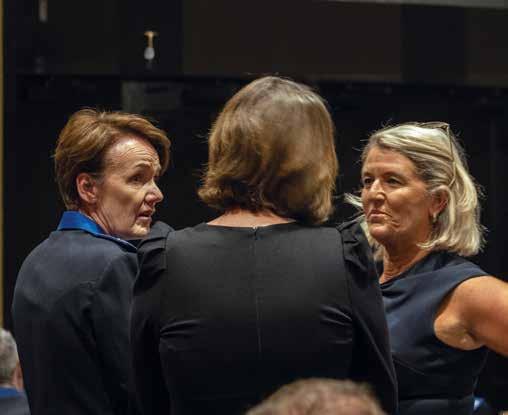

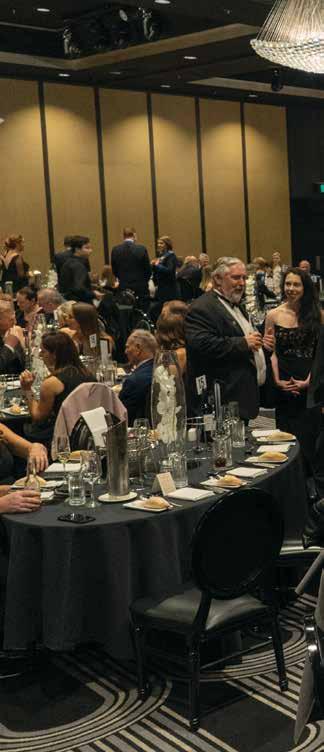
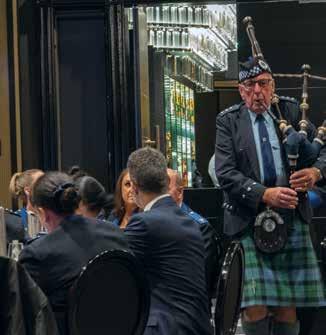
38 PANSW Police News Sept-October 2023 PANSW COMMISSIONED OFFICERS DINNER - 11/8/23
CLOCKWISE FROM TOP LFET: THE NSW POLICE COMMISSIONER AND POLICE MINISTER TALK / THE MAIN ROOM IN DALTON HOUSE / FORMAL UNIFORMS MIXED WITH OLDSCHOOL GLAMOUR / PIPING IN THE PORT / PICTURE WALL WAS A HIT / GARY MERRYWEATHER HAS RETIRED
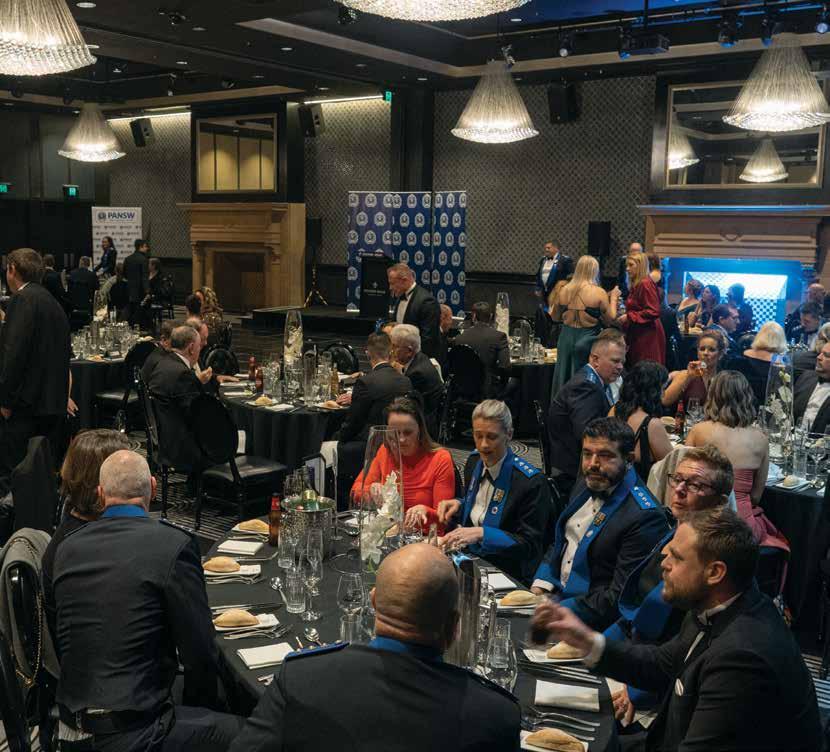

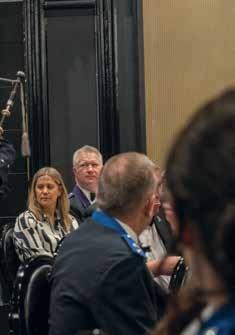
PANSW Police News Sept-October 2023 39 PANSW COMMISSIONED OFFICERS DINNER - 11/8/23
NSW Police Remembrance Day Speech by the Hon Chris Minns MP, Premier of New South Wales

"Today, we honour the men and women of the NSW Police Force who have died in the line of duty.
Across Australia and throughout the Pacific, people are gathering to mark National Police Remembrance Day.
It’s a solemn occasion - a chance to reflect and pay tribute to the brave men and women who keep our communities safe.
On the Wall of Remembrance [behind me], 275 names are etched. We are grateful that no new names have been added this year. But this hasn’t been the case everywhere.
Today, we pause to remember the sacrifice of: Constable Matthew Joseph Arnold and Constable Rachel Clare McCrow of the Queensland Police Force, and Constable Anthony Woods of the Western Australia Police Force.
All three were killed while performing their duties in the last 12 months.
These officers embody the courage and sense of community service that are universal to the men and women who are drawn to this profession.
Today, we also pay our respects to the 14 serving members of the NSW Police Force who have passed away in the last 12 months. We welcome their family, friends and loved ones to this service,
and we join with them in their mourning. Police Remembrance Day is a reminder to the entire community of the dangers police officers face every day. Any one of the two million calls attended to by our officers in NSW, has the potential to end in tragedy – to lead to another name being etched on the wall.
Nothing can highlight the dangers of policing more than the deaths of Constables Arnold and McCrow, ambushed on a rural property in Queensland. Nothing better showcases the bravery of police, than their colleagues attempts to save them while under gunfire.There is simply no ordinary day for the members of our police force; no day where their safety can be taken for granted.
The toll this takes – on the officers themselves, but also their loved ones –cannot be overstated.
I am proud that NSW was the first state in Australia to recognise officers on our Wall of Remembrance, who have died as a result of suicide. This is recognition of the terrible toll modern policing can take on our officers. It also demands that Government and society works together to support the mental health and wellbeing of all our front-line personnel. We expect so much from our officers.
We expect them to be problem solvers, educators, mediators and – always – the first line of defence. We expect them to defend and uphold the values that our society holds closest to its heart. Values like fairness and justice, protecting the most vulnerable, and acting with integrity and accountability.
Ultimately, we expect them to run into danger to keep us safe, when every instinct says to run away or hide.
The fact that they do this, each and every day, is no less extraordinary for being routine.
And so on National Police Remembrance Day, we thank police for their commitment to serving our community.
Being a police officer is a dangerous vocation – the threats to your life are real. But so too is the community’s pride in your work and the Government’s backing and support.
We are proud to stand with you as you remember and honour your fallen.
We are honoured to stand with you as you comfort their grieving families and friends. And we commit ourselves to doing this, not just today, but each and every day of the year.
Thank you."
NATIONAL POLICE REMEMBRANCE DAY
40 PANSW Police News Sept-October 2023
"Being a police officer is a dangerous vocation - the threats to your life are real, but so too is the community’s pride in your work."
meal-break crossword
Beverages of the World
DOWN
1 Spanish punch made with red wine and chopped fruit.
2 British regiment formed to relieve First Fleet’s NSW Marine Corps. Notorious traders.
3 Australian slang for the bladder found inside a wine cask.
4 Admiral Nelson’s body was transported back from the battle of Trafalgar in a barrel filled with which distilled liquor.
5 Rehydration is the cure for what?
6 Clear alcoholic beverage, traditionally distilled from fermented potatoes and grain.
7 (German proverb) Beer then wine, das is fine. Wine then Beer, das is (f...)
8 A sweet red wine named after its grape variety.
13 If a footy player gets ’touched up’, what might metaphorically might flow from their head?
14 Mother’s ruin.
15 A spirit made with wormwood, anise and fennel. Popular with turn of the century Bohemians. Banned.
16 English slang for cheap wine (also a drop sound).
17 David Boon drank 52 consecutive cans of beer, inflight on the way to play cricket where?
19 19th century movement who’s goal was to curb alcohol consumption. Women's Christian (—) Union.
21 Winston Churchill’s daily morning “mouthwash”
22 Smallest beer size in Australia?
24 Delirium tremens are a withdrawal symptom associated with what addiction?
27 Australian Prime Minister who held the world record for drinking a yard of beer. Abstained in Office. (2 words)
ACROSS
1 Imbibed warm with Sashimi.
9 Americans boycotted this lager because of a marketing campaign gone wrong (2 words).
11 Alcohol: stimulant and depressant?
12 AA stands for … (2 words)
14 September sporting fixture associated with a 20% spike in family violence (2 words)
18 True or false: Difficult interpersonal conversations go better when drunk?
20 Equal parts lemonade and beer.
23 Dom Pérignon, Moet & Chandon and Veuve Clicquot are all what?
25 Organic material used to seal traditional wine bottles
26 Which city hosts Australia’s annual beer-can regatta
28 City that introduced terms: flophouse, dive-bar and bowery-bum (2 words)
29 Homer’s beer.
30 The difference between a White and a Black Russian?
20 21 22 23 24 25 26 27 28 29 30
At Police Bank, we’re different, because you are. We’ve served those who serve us for almost 60 years. Now it’s time to help you. For savings accounts or award winning loans, contact us today. Police Bank Ltd. ABN 95 087 650 799. AFSL/Australian Credit Licence No. 240018 We’re here when you need us 131 728 policebank.com.au The bank where you belong












































































 Tim Sinclair NSW Police Legacy Marketing and Communications Manager
Tim Sinclair NSW Police Legacy Marketing and Communications Manager

















